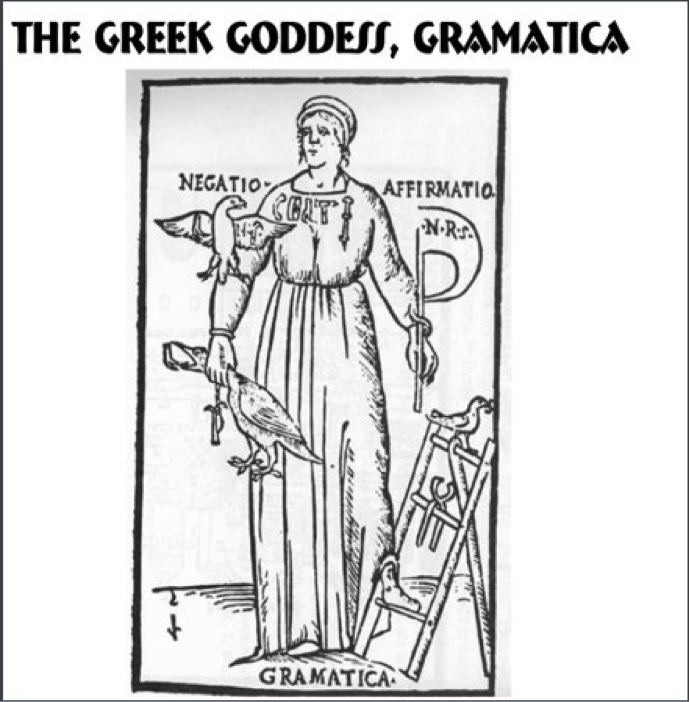Does syntax make your head spin? Do sentence diagrams fill you with dread? Are you awash in anguish over alliteration? Or do you happen to be someone who loves the word “whom” and reads Garner’s Modern American Usage for fun? Whichever grammar tribe you belong to—the haters or the lovers—we as tutors often find ourselves in situations with writers who ask for help with grammar. The most common reason for writers seeking help with grammar is to “improve” or “fix” their papers. Decades of research have shown that the specific teaching of grammar rules doesn’t really improve student writing. So what is a tutor to do?
What doesn’t work: The 50 years of research
“The results have been consistently negative so far as the value of grammar in the improvement of language expression is concerned. Surely there is no justification in the available evidence for the great expenditure of time and effort still being devoted to formal grammar in American schools” (DeBoer, 1959).
“Diagramming sentences . . . teaches nothing beyond the ability to diagram” (1960 Encyclopedia of Educational Research).
“The teaching of formal grammar has a negligible or, because it usually displaces some instruction and practice in actual composition, even a harmful effect on the improvement of writing” (Braddock, Lloyd-Jones, and Schoer, 1963).
“None of the studies reviewed for the present report provides any support for teaching grammar as a means of improving composition skills. If schools insist upon teaching the identification of parts of speech, the parsing or diagramming of sentences, or other concepts of traditional grammar (as many still do), they cannot defend it as a means of improving the quality of writing” (Hillocks, 1986).
“For most students, the systematic study of grammar is not even particularly helpful in avoiding or correcting errors” (Elley et al., 1976; McQuade, 1980; Hillocks, 1986).
The research is pretty united: teaching grammar may not be the best or most effective way of teaching writing or helping students improve their writing.
What works better: The research
“Studying formal grammar is less helpful to writers than simply discussing grammatical constructions and usage in the context of writing” (Harris, 1962).
“Learning punctuation in the context of writing is much more effective than studying punctuation marks and rules for punctuation in isolation” (Calkins, 1980).
“Usage, sentence variety, sentence-level punctuation, and spelling are applied more effectively in writing itself when studied and discussed in the context of writing, rather than through isolated skills instruction” (DiStefano and Killion, 1984).
“Systematic practice in combining and expanding sentences can increase students’ repertoire of syntactic structures and can also improve the quality of their sentences, when stylistic effects are discussed as well” (Hillocks and Smith, 1991).
“For learners of English as a second language, research suggests that extensive reading may promote the acquisition of grammatical structures better than explicitly studying or practicing such structures” (Elley, 1991).
“Indeed, for both first and second language learners, extensive reading significantly promotes grammatical fluency and a command of the syntactic resources of the language” (Krashen, 1993).
Again, the results are conclusive: grammar is best learned through application and practice, in the context of writing and reading, rather than learned on its own for its own sake. Mike Rose (1983) takes the writing teacher’s vigilance for grammatical error, which most likely conveys to students a very restricted model of the composing process, to a whole new level. Here is Rose on the subject of grammar:
“The Middle Ages envisioned the goddess of grammar, Grammatica, as an old woman, severe, with a scalpel and a large pair of pincers. Her right hand grasps a bird by its neck, its mouth open, as if in a gasp or squawk. Lord, how fitting the choices of emblem—the living thing being strangled beak open but silent, muted by the goddess Grammatica. And the scalpel, the pincers, are reminders to the teacher to be vigilant for error, to cut it out with the coldest tool. Laura knows the goddess intimately; the squinting figure breathes up to her side whenever she sits down to write” (p 113).
The metaphor here — of the student being so strangled by grammar rules that his or her writing comes out as a gasp or squawk– translates into the need for teaching and tutoring pedagogy that rejects prioritizing the learning of grammar rules and instead concerns itself with learning writing and reading, and learning grammar as a natural byproduct of those processes.
Tips for tutors: Using grammar as a writing aid in appointments
- In both face-to-face and asynchronous appointments, bring the writer’s attention to the grammatical concepts that represent a pattern of error and are needed for clarity, and let the writer choose how to edit the errors.
- Help writers expand their understanding of grammar by experimenting with specific and effective examples and discussing the results. Grammatical terminology can be used, but need not be taught as an end in itself.
- Have students experiment with and discuss various activities in sentence combining, expanding, and manipulating.
- Give writers plenty of encouragement along with assistance with sentence structure and the mechanics of writing, which sometimes eliminates those pesky grammar errors.
Grammar rules matter, and for certain kinds of writing, they should be followed. And if a writer wants to know when to use a semicolon rather than a comma or the difference between the present and the present perfect tense, we should oblige, even if we don’t think these things really matter. Because it does matter to the writer, who understands or is responding to the secret message of grammar that says to the reader, who is often the instructor, “I have a point to make” and “I deserve to be heard.”
What strategies do you use to help writers learn or “improve” their grammar, as so many desire? Share them in the comments below!
Discover more from UCWbLing
Subscribe to get the latest posts sent to your email.


